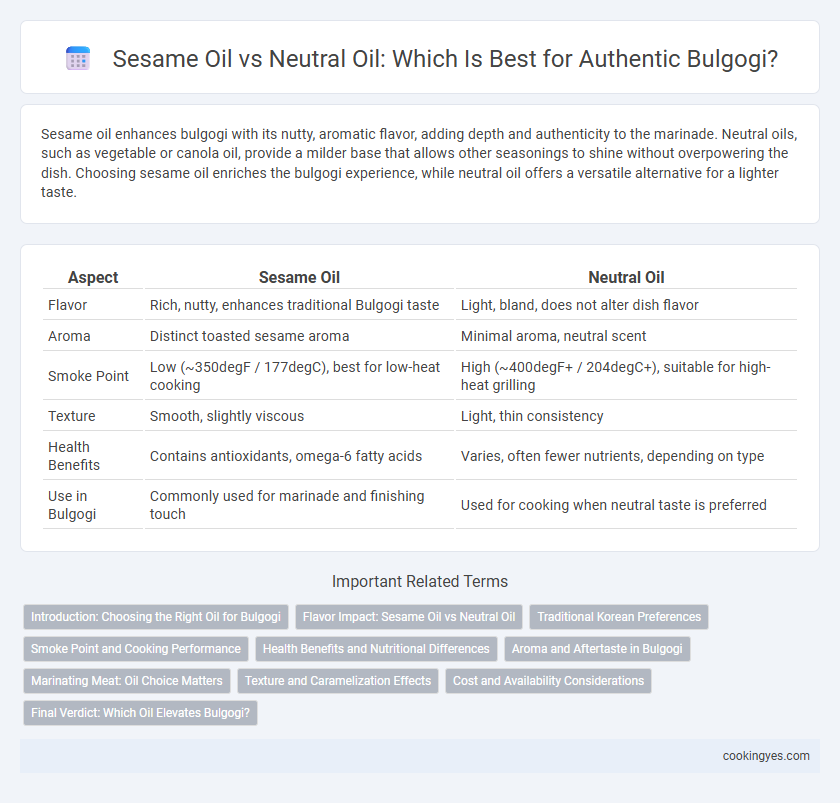Sesame oil enhances bulgogi with its nutty, aromatic flavor, adding depth and authenticity to the marinade. Neutral oils, such as vegetable or canola oil, provide a milder base that allows other seasonings to shine without overpowering the dish. Choosing sesame oil enriches the bulgogi experience, while neutral oil offers a versatile alternative for a lighter taste.
Table of Comparison
| Aspect | Sesame Oil | Neutral Oil |
|---|---|---|
| Flavor | Rich, nutty, enhances traditional Bulgogi taste | Light, bland, does not alter dish flavor |
| Aroma | Distinct toasted sesame aroma | Minimal aroma, neutral scent |
| Smoke Point | Low (~350degF / 177degC), best for low-heat cooking | High (~400degF+ / 204degC+), suitable for high-heat grilling |
| Texture | Smooth, slightly viscous | Light, thin consistency |
| Health Benefits | Contains antioxidants, omega-6 fatty acids | Varies, often fewer nutrients, depending on type |
| Use in Bulgogi | Commonly used for marinade and finishing touch | Used for cooking when neutral taste is preferred |
Introduction: Choosing the Right Oil for Bulgogi
Sesame oil enhances bulgogi with its rich, nutty flavor that complements the marinated beef, adding depth and authenticity to the dish. Neutral oils like canola or vegetable oil provide a high smoke point and a clean taste, allowing the natural flavors of the soy sauce, garlic, and sugar to shine without overpowering the meat. Selecting sesame oil is ideal for traditional Korean recipes, while neutral oils suit high-heat cooking and lighter variations of bulgogi.
Flavor Impact: Sesame Oil vs Neutral Oil
Sesame oil imparts a rich, nutty aroma and deep flavor that enhances the authentic taste of bulgogi, adding complexity and warmth to the marinade. Neutral oils such as canola or vegetable oil offer a subtle base, allowing the soy sauce, garlic, and sugar flavors to stand out without altering the traditional profile. Choosing sesame oil intensifies the savory depth and produces a more fragrant and robust bulgogi experience compared to the milder effect of neutral oils.
Traditional Korean Preferences
Traditional Korean Bulgogi recipes favor sesame oil for its rich, nutty flavor that enhances the marinated beef's umami profile, aligning with authentic taste preferences. Sesame oil's aromatic qualities contribute to the dish's signature savory depth, which is less prominent when using neutral oils like canola or vegetable oil. This traditional choice supports the cultural emphasis on layering complex flavors in Korean cuisine.
Smoke Point and Cooking Performance
Sesame oil, with a low smoke point around 350degF (175degC), adds rich, nutty flavor to bulgogi but can burn quickly at high heat, affecting cooking performance. Neutral oils such as vegetable or canola oil have higher smoke points around 400-450degF (204-232degC), allowing better searing and caramelization without smoke or bitterness. For optimal bulgogi results, combining a small amount of sesame oil for flavor with a neutral oil for high-heat cooking balances taste and performance effectively.
Health Benefits and Nutritional Differences
Sesame oil, rich in antioxidants like sesamol and vitamin E, offers heart-healthy fats and anti-inflammatory properties ideal for bulgogi preparation. Neutral oils such as canola or vegetable oil contain higher levels of polyunsaturated fats but lack the distinct antioxidants found in sesame oil, making them less beneficial for cardiovascular health. Using sesame oil enhances flavor while providing essential nutrients that support metabolism and reduce oxidative stress compared to neutral oils.
Aroma and Aftertaste in Bulgogi
Sesame oil imparts a rich, nutty aroma and a distinctive, lingering aftertaste that enhances the traditional flavor profile of bulgogi. Neutral oil, such as vegetable or canola oil, offers a more subtle scent and does not mask the marinated beef's natural flavors, resulting in a cleaner aftertaste. Choosing sesame oil intensifies the dish's depth with its aromatic qualities, while neutral oil maintains the bulgogi's original savory notes without added fragrance.
Marinating Meat: Oil Choice Matters
Sesame oil enhances bulgogi marination by imparting rich, nutty flavors that penetrate the meat, while neutral oils like canola or vegetable provide a subtle base without altering the marinade's taste. The aromatic compounds in toasted sesame oil complement traditional Korean spices, increasing the depth of flavor and tenderness during the marinating process. Choosing the right oil balances moisture retention and flavor infusion, crucial for achieving authentic, juicy bulgogi.
Texture and Caramelization Effects
Sesame oil enhances bulgogi by imparting a rich, nutty aroma and a slightly oily texture that aids in caramelizing the sugar content for a deeper, more complex flavor profile. Neutral oils, such as vegetable or canola oil, offer a lighter texture and higher smoke point, allowing faster caramelization without overpowering the dish's natural flavors. Using sesame oil results in a tender, glossy finish, while neutral oils provide a crisp exterior but can lack the signature depth associated with traditional bulgogi.
Cost and Availability Considerations
Sesame oil, essential for authentic bulgogi, tends to be pricier and less widely available than neutral oils like canola or vegetable oil, affecting overall cost. Neutral oils offer a more budget-friendly option and are commonly found in supermarkets worldwide, making them accessible for everyday cooking. Choosing sesame oil enhances flavor but requires balancing higher expense and limited supply compared to the affordable, widely available neutral oils.
Final Verdict: Which Oil Elevates Bulgogi?
Sesame oil enhances bulgogi with its rich, nutty aroma and authentic Korean flavor, making it the preferred choice for traditional recipes. Neutral oils, such as vegetable or canola oil, offer a higher smoke point and a more subtle taste, allowing the marinade's ingredients to shine without overpowering the dish. The final verdict favors sesame oil for elevating bulgogi's depth and aroma, while neutral oil suits those seeking a milder flavor profile.
Sesame oil vs neutral oil for bulgogi Infographic

 cookingyes.com
cookingyes.com